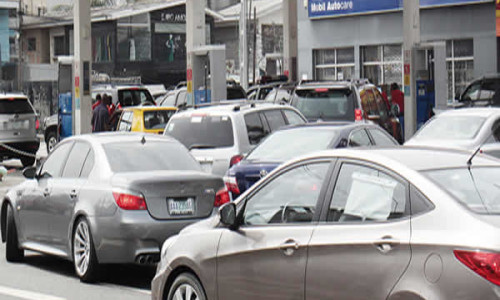
There is urgent need to deregulate the downstream petroleum industry
As Nigerians experience yet another round of woes at the petrol stations, the question on the lips of most motorists is whether we would ever see the end to the perennial shortages that have come to define the management of the downstream petroleum industry. It is an issue that should worry the current administration.
For several days now, Nigerians have been queuing desperately at petrol stations to fuel their vehicles. Even though no rational explanation has been proffered by the relevant authorities, beyond the trading of blame between the Independent Petroleum Marketers Association of Nigeria (IPMAN) and the Nigeria National Petroleum Corporation (NNPC), the bottom line remains that the refusal to fully deregulate the sector is at the heart of the problem.
In his 2016 budget speech to the National Assembly last December, President Muhammadu Buhari said he had “directed the Petroleum Products Pricing Regulatory Agency (PPPRA) to adjust its pricing template to reflect competitive and market driven components. We believe this can lower input costs and attain efficiency savings that will enable PPPRA to keep the selling price for all marketers of petrol at N87 per litre for now”. The implication of that statement is that nothing has changed in the sector even when President Buhari assured that “government is working very hard to end these shortages and bring fuel to the pumps all over the country”. But the question remains: how?
As we stated in previous editorials on this issue, the sloppy handling of what is clearly a reform agenda, however well-intentioned, could put its implementation at serious risk. That is why we advocated a genuine and transparent dialogue between the federal government and critical stakeholders, including organised labour, where all the issues would be put on the table and a lasting solution could be found. But because that was not done, with only the falling price of crude as the “saving grace” for now, the perennial fuel shortages quite naturally persist.
Properly managed, there are economic benefits to the deregulation of the downstream sub-sector as has been demonstrated in the telecommunications sector over the last 15 years. Besides, given the low crude oil price environment, there can be no better time to implement such a policy than now.
Going forward, there are a number of things that would need to be done. One, we need to sell off the old refineries that have become a huge drain on scarce resources. If any more evidence was needed to show how Nigeria has been badly managed, it is indeed in the sorry state of the country’s four petroleum refineries. Despite initial claims of robust performance, the refineries in Port Harcourt, Warri and Kaduna, on average, actually recorded capacity utilisation of 10 per cent last year, according to the NNPC. The NNPC report indicates that between January and August 2015, the three refineries operated at a total loss of N31.682 billion, with Kaduna refinery accounting for the highest loss of N26.183 billion, while Warri and Port Harcourt made losses of N8.496 billion and N8.057 billion respectively.
It is doubtful if many Nigerians were surprised by the report. Over the years, the refineries have continued to fail in terms of satisfying the essence of their establishment, given that the shameful importation of petroleum products has become a major and running routine in the economic management of the country. The reason, as often adduced by the industry experts, is that the refineries have either all broken down due to the poor maintenance culture or installed capacity cannot even meet the ever-growing local demand for petroleum products.
·To be concluded friday


Be the first to comment